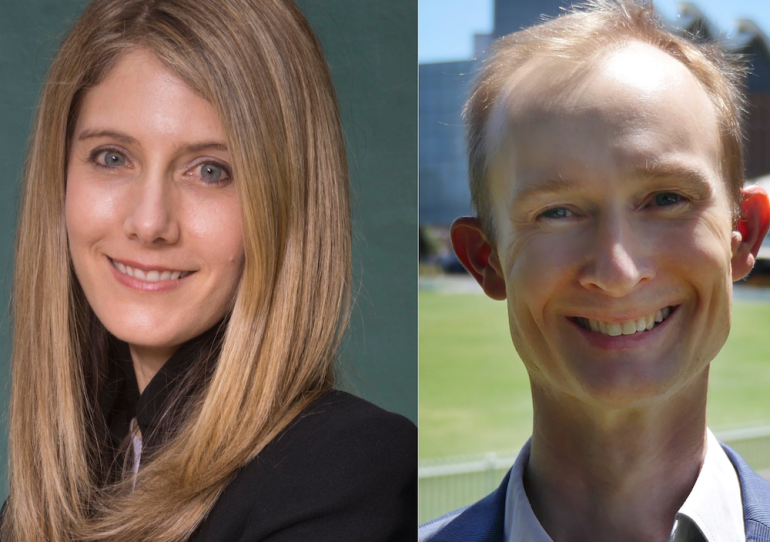Two UNSW Sydney academics have received Australian Laureate Fellowships from the Australian Research Council (ARC) in the latest round of funding. This scheme supports internationally recognised researchers who play a significant leadership and mentoring role in building Australia’s research and innovation capacity.
Scientia Professor Jane McAdam, Director of the Andrew & Renata Kaldor Centre for International Refugee Law at UNSW Law & Justice, has been awarded $3.14 million for her project. ‘Evacuations in international law: disasters, conflict and humanitarian crises’ will tackle the crucial issue of evacuations, including from disasters, climate change, conflict, humanitarian emergencies and pandemics.
Professor Gary Froyland, at UNSW Science’s School of Mathematics and Statistics, has been awarded $2.53 million for his project. ‘Breakthrough mathematics for dynamical systems and data’ will develop new mathematics to extract emergent structures from data, which supply predictive and actionable information to guide our responses to natural disasters, climate change and social conflicts.
Jane McAdam: evacuations from crises
Evacuations can be a life-saving tool to move people away from imminent harm. But they can also displace people, often for prolonged periods and at great social, economic and personal cost. This research program will transform how we conceive of, implement and evaluate evacuations as a form of rescue in international law and practice. This new field of scholarly inquiry will generate transformative legal and policy reform to safeguard the rights of evacuees, enhancing the protection of millions of people worldwide.
“It is such an honour to be named an Australian Research Council Laureate Fellow, and I am deeply grateful to the ARC for recognising the promise of this research program,” Prof. McAdam said.
“The Fellowship will enable me to appoint and mentor a team of early career researchers in international law, forced migration studies and history. It will provide them with opportunities for policy innovation and impact within the world-class research environment of the Kaldor Centre. It is unbelievably wonderful to cultivate future research leaders in this way.”
Professor Nicholas Fisk, UNSW Deputy Vice-Chancellor, Research and Enterprise, congratulated Prof. McAdam on the Fellowship.
‘With the number of displaced people increasing globally – and likely to grow as the impacts of climate change are felt more intensely – this research is exceptionally timely. Its practical and highly innovative applications are set to be a game-changer in how the international community understands, responds to and manages evacuations. This includes a range of situations, including floods and fires in Australia, emergencies such as those seen in Afghanistan and Ukraine, or sea level rise in the Pacific,” Prof. Fisk said.
Gary Froyland: modelling of complex systems
The weather and the climate, along with social processes, biological processes and engineering processes, are governed by a set of micro-rules at the level of individual states that describe how these processes evolve over time. Emergent behaviour in these processes is typically connected with the appearance of macrostructures that impact our daily world, but it is challenging to identify key organising emergent phenomena from micro-rules. The Fellowship will significantly boost Australia’s efforts to distil key organising rules from data to enhance the characterisation and prediction of complex dynamic processes, with benefits flowing to many areas of basic and applied science.
“I am humbled to receive this Australian Research Council Laureate Fellowship, and greatly appreciative of this investment in fundamental science,” said Prof. Froyland.
“I am looking forward to creating an amazing team of young researchers, and working with them toward the goals of the Fellowship program to deliver universal fundamental advances, as well as real impacts in weather, climate and social dynamics.”
Prof. Fisk also congratulated Prof. Froyland on his grant success.
“This project will generate new knowledge in modelling complex systems and new pathways for unsupervised machine learning. Outcomes will include a tranche of new mathematics and next-generation algorithms to discover hidden human-understandable patterns in complex data sets. Gary’s research will benefit many areas of science,” he said.
